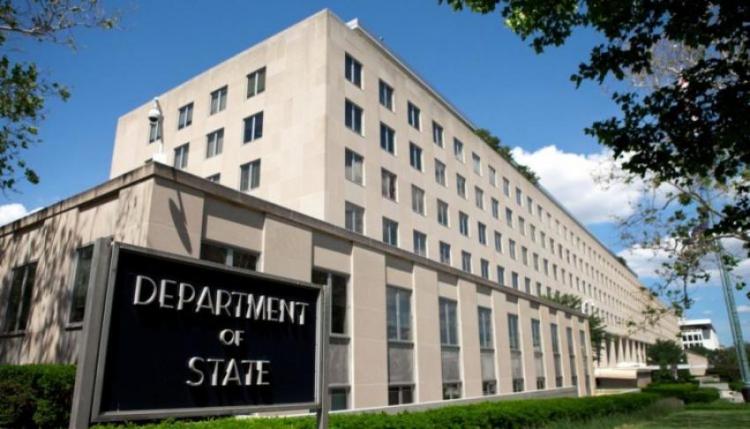Caesar sanctions do not include areas not controlled by Damascus – Senior US official
Washington – North-Press Agency
Hadeel Oueiss
A senior State Department official told North-Press on Wednesday that the Caesar Act sanctions do not include areas which are not under the control of Damascus, and these areas will not be affected by those sanctions.
The official added that the aim of the act is to pressure al-Assad financially to stop seeking a military solution and convince him that there is no way to advance except for a political solution and acceptance of UN Security Council Resolution 2254.
In January 2019, the US House of Representatives unanimously passed the Civilian Protection Act, or the Caesar Act, which provides for sanctions against the Syrian government and countries that support it, such as Iran and Russia, for 10 years.
The name of the act originally comes from a Syrian military photographer who defected from the Syrian government in 2014 and leaked 55,000 photographs of 11,000 prisoners killed under torture. He used the name Caesar to hide his true identity.
The Caesar Act is scheduled to come into force in June, according to the May announcement of the US Envoy to Syria James Jeffrey.
It does not include "innocent groups"
"Al-Assad uses any resources that reach his hands to fuel the war in Syria and not to secure the needs of the people, and he seems to have unlimited resources and potential to continue paying for the war. But when it comes to securing the needs of Syrians, he doesn't even care about securing bread, including in cities like Latakia and Tartous," the U.S. official said.
In response to whether the sanctions would affect northeastern Syria, the U.S. diplomat said the sanctions include a mechanism to make sure that the areas outside of the Assad regime are not targeted by sanctions to ensure that innocent groups are not punished for Assad's crimes.
He added that the sanctions do not target the Syrian people but the government and its capabilities, as the United States has given Syrians generous humanitarian aid that exceeds $10 billion since the beginning of the war.
The U.S. forces maintain a military and intelligence presence in North and East Syria, although the number of the US troops was reduced late last year following President Donald Trump's decision to withdraw from Syria.
The official said the US presence in northeastern Syria has a specific mission aimed at ensuring the permanent elimination of the Islamic State (ISIS), preventing the terrorist organization from rebuilding support cells in the region, and protecting oil-rich areas from falling into the hands of the terrorist groups such as ISIS.
The US-led Global Coalition forces are supporting the SDF in pursuing ISIS cells, and the areas of Deir ez-Zor in eastern Syria in particular witness almost daily operations.
Regarding the US vision of resolving the crisis in Syria, the US diplomat said that the United States wants to reach a political solution in accordance with United Nations Resolution No. 2254, which will include all Syrians, including components of northeastern Syria, northwestern Syria, and others.
Regarding who will be targeted by the Caesar Act, the official stated that the countries and external parties that support the process of reconstruction in regime areas will be included in the sanctions, because the United States believes that these parties will benefit from the reconstruction funds and therefore will continue to oppress Syrians and launch military attacks.
He said that the United States does not think it is fair to allow other countries to build apartments and luxury buildings in Damascus while the Syrian people suffer from hunger in addition to the scourge of the ongoing war. The United States thinks that al-Assad is the one who wants the war to continue.
Washington's view of Rami Makhlouf
Regarding Washington's view of the Syrian President's cousin and businessman Rami Makhlouf, the US official said that the United States considers him a fundamental pillar extending the regime's ability to commit crimes and fuel the war in the last nine years.
"Makhlouf is under US sanctions as a result of his main and persistent support to Damascus' efforts to finance the region's instability," according to the US official.
The relationship between Syrian President Bashar al-Assad and his cousin is deeply troubled after Makhlouf made it public via videos he posted on his Facebook account recently.
Russia and Bashar al-Assad
Regarding Russia's desire to stop supporting al-Assad, the official said, "It is something that drives the United States to be optimistic, but Russia continues to be the first and main supporter of the Assad regime and its battles in Idlib or elsewhere, are followed by Iran."
More than five years after Russia officially intervened in the war in Syria supporting government forces; several media reports have reported a Russian intention to stop supporting the Syrian president.
As for the contacts between the two parties, the US official said that Russia is telling them of its commitment to push for a political transition in Syria, without taking any new real steps in this regard.
He added, "Russia's ultimate interest is to agree with the United States on its vision in Syria and to commit to the political transition."

